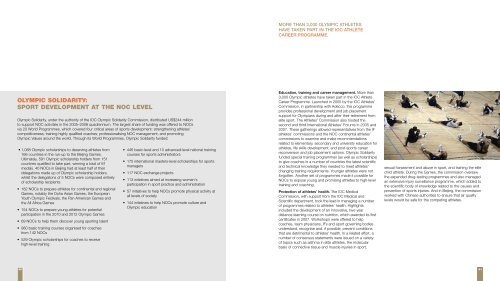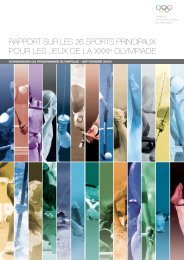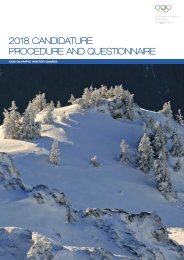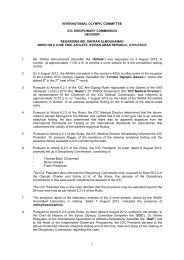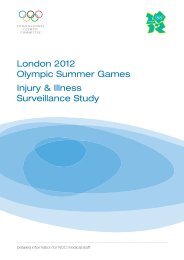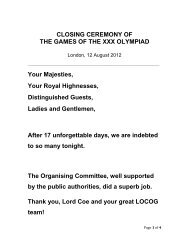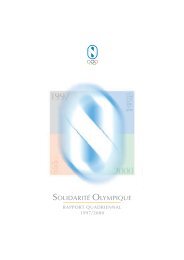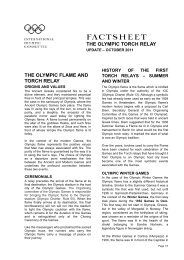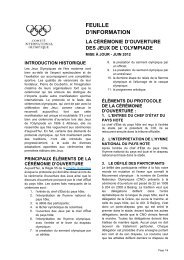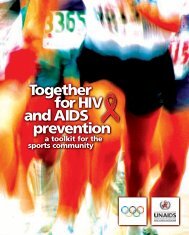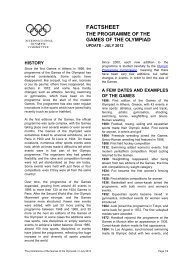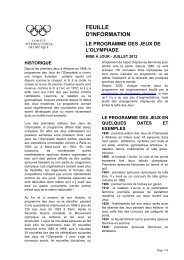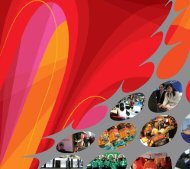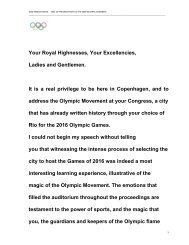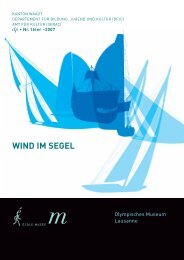3912 reportcomplete final web:layout 1
3912 reportcomplete final web:layout 1
3912 reportcomplete final web:layout 1
Create successful ePaper yourself
Turn your PDF publications into a flip-book with our unique Google optimized e-Paper software.
OLYMPIC SOLIDARITY:<br />
SPORT DEVELOPMENT AT THE NOC LEVEL<br />
Olympic Solidarity, under the authority of the IOC Olympic Solidarity Commission, distributed US$244 million<br />
to support NOC activities in the 2005–2008 quadrennium. The largest share of funding was offered to NOCs<br />
via 20 World Programmes, which covered four critical areas of sports development: strengthening athletes’<br />
competitiveness; training highly qualified coaches; professionalising NOC management; and promoting<br />
Olympic Values around the world. Through its World Programmes, Olympic Solidarity funded:<br />
1,088 Olympic scholarships to deserving athletes from<br />
166 countries in the run-up to the Beijing Games.<br />
Ultimately, 591 Olympic scholarship holders from 151<br />
countries qualified to take part, winning a total of 81<br />
medals. 40 NOCs in Beijing had at least half of their<br />
delegations made up of Olympic scholarship holders,<br />
whilst the delegations of 5 NOCs were composed entirely<br />
of scholarship recipients<br />
182 NOCs to prepare athletes for continental and regional<br />
Games, notably the Doha Asian Games, the European<br />
Youth Olympic Festivals, the Pan American Games and<br />
the All Africa Games<br />
154 NOCs to prepare young athletes for potential<br />
participation in the 2010 and 2012 Olympic Games<br />
69 NOCs to help them discover young sporting talent<br />
980 basic training courses organised for coaches<br />
from 142 NOCs<br />
529 Olympic scholarships for coaches to receive<br />
high-level training<br />
40<br />
446 basic-level and 10 advanced-level national training<br />
courses for sports administrators<br />
175 international masters-level scholarships for sports<br />
managers<br />
117 NOC exchange projects<br />
113 initiatives aimed at increasing women’s<br />
participation in sport practice and administration<br />
57 initiatives to help NOCs promote physical activity at<br />
all levels of society<br />
144 initiatives to help NOCs promote culture and<br />
Olympic education<br />
MORE THAN 3,000 OLYMPIC ATHLETES<br />
HAVE TAKEN PART IN THE IOC ATHLETE<br />
CAREER PROGRAMME.<br />
Education, training and career management. More than<br />
3,000 Olympic athletes have taken part in the IOC Athlete<br />
Career Programme. Launched in 2005 by the IOC Athletes’<br />
Commission, in partnership with Adecco, this programme<br />
provides professional development and job placement<br />
support for Olympians during and after their retirement from<br />
elite sport. The Athletes’ Commission also hosted the<br />
second and third International Athletes’ Forums in 2005 and<br />
2007. These gatherings allowed representatives from the IF<br />
athletes’ commissions and the NOC continental athletes’<br />
commissions to examine and make recommendations<br />
related to elementary, secondary and university education for<br />
athletes, life skills development, and post-sports career<br />
reconversion and job placement options. Olympic Solidarity<br />
funded special training programmes (as well as scholarships)<br />
to give coaches in a number of countries the latest scientific<br />
and technical knowledge they needed to meet athletes’<br />
changing training requirements. Younger athletes were not<br />
forgotten. Another set of programmes made it possible for<br />
NOCs to expose young and promising athletes to high-level<br />
training and coaching.<br />
Protection of athletes’ health. The IOC Medical<br />
Commission, with support from the IOC Medical and<br />
Scientific department, took the lead in managing a number<br />
of programmes related to athletes’ health. Highlights<br />
included the development of an innovative, two-year<br />
distance-learning course on nutrition, which awarded its first<br />
certificates in 2007. Workshops were offered to help<br />
coaches, team physicians, IFs and sport governing bodies<br />
understand, recognise and, if possible, prevent conditions<br />
that are detrimental to athletes’ health. In a related effort, a<br />
number of consensus statements were issued on a variety<br />
of topics such as asthma in elite athletes, the molecular<br />
basis of connective tissue and muscle injuries in sport,<br />
sexual harassment and abuse in sport, and training the elite<br />
child athlete. During the Games, the commission oversaw<br />
the expanded drug-testing programmes and also managed<br />
an extensive injury surveillance programme, which added to<br />
the scientific body of knowledge related to the causes and<br />
prevention of sports injuries. And in Beijing, the commission<br />
worked with Chinese authorities to ensure that air quality<br />
levels would be safe for the competing athletes.<br />
41


